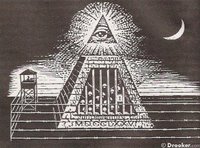
 The piece begins with a comparison of Mr. Robbins to Morgan Freeman. Not so much, it is said, because of his physical strength despite an aged, frail frame, or the graying hair and beard, but because of his „klugen Augen“, which - depending on the author's intent - means either clever, prudent, or intelligent eyes. He further refers to the way Mr. Robbins (and Morgan Freeman) look at one in a reassuringly kind and soft-spoken, yet penetrating way. A way which indicates that the eyes must have seen an awful lot (viel gesehen haben muessen).
The piece begins with a comparison of Mr. Robbins to Morgan Freeman. Not so much, it is said, because of his physical strength despite an aged, frail frame, or the graying hair and beard, but because of his „klugen Augen“, which - depending on the author's intent - means either clever, prudent, or intelligent eyes. He further refers to the way Mr. Robbins (and Morgan Freeman) look at one in a reassuringly kind and soft-spoken, yet penetrating way. A way which indicates that the eyes must have seen an awful lot (viel gesehen haben muessen).Speaking of crafty looks, not too long ago a local café owner instructed her employees to beware of black customers in general, but especially those with dreadlocks and/or „klugen Augen“, in that it was specifically these customers who - according to the owner, by using her café as a place to deal drugs - were threatening her proprietorship.
Forget that just about all the black people in the area fit the description. The instruction required that the black patrons be profiled, and when necessary, refused service. This is no doubt seen by some as a logical step to take: If one makes the assumption that these particular persons pose a greater potential liability to the café, then they should be paid particular attention to. This is instrumental in validating such injustice. However, even if the instructions were based strictly upon the fear of closure - which in this case they very well could have been - it is an example of how the unjust actions of a justice apparatus trickle down and poison the community.
I think that while the verbal choice of both of these examples indicate a certain lack of political correctness (the attitude and accompanying body of expression which has led to as strong an anti-pc movement), it is this convenient perception based on a reality viewed from the so-called majority which has led to a lazy way of thinking that one can’t take care of everyone, so let’s not get buried in detail, or the ultra-anti-pc which dictates that one just stop whining.
In defense of Christo Foerster, the comparison of Harvey Robbins to Morgan Freeman is clearly about his admiration of sage-like strength in the face of adversity. Furthermore, my subsequent mention of the less-than-prudent choices made by the café owner are meant as contrast more than comparison. Nevertheless, the main problem still seems to be the majority perception that makes assumptions based upon majority established facts.
On to the second article, in which M. Marut documents the privatization of the US prisons: The piece refers back to the eighties, and the deregulatory policies of the Reagan administration as the foundation of this development. Mention is made of the first completely private prison, which was established in Texas in 1984.
Appropriately, the writer chooses the expression „in Betrieb“, which is typically used for the bringing into operation of factories or plants. I can’t help but be reminded of the word "plantation" and its historical meaning, as well as the politically convenient usage by Senator Hillary Clinton recently. It was under the leadership of her husband that the Justice Department signed numerous deals with the Correctional Corporation of America, and Wachenhut.
Between Clinton and Reagan, however, came George H. W. Bush, whose mandatory-minimum sentencing law for drug offenders led to an even greater growing number of prisoners, and the continuing trend that those targeted were predominantly minorities of the darker-skinned variety. My choice of words here is another reference to the ongoing practice of profiling: establishing just who a suspect is based upon physical appearance.
Time and again - if you believe in polls - one finds general support for both profiling on the outside, and labor on the inside (prison). Many seem to come to the conclusion - if you can call it that - that the fact that minorities are a majority in jail means that minorities commit far more crime than the rest of the community, and that “the rest” mostly law-abiding citizens need to be protected from the mostly criminal who just happen to be (to put it innocently) minorities.
Is it not logical to save time and effort by targeting the few to protect the many? This question actually sounds like a poll-styled formulation. If you've ever been polled, then you know what I'm talking about. And when asked about the sense it makes to put convicts to work, it precludes any meaningful discussion as to how this might be an indirect threat to those who might want a job without having to go to jail to get it.
As I mentioned before, it was during the Clinton years that the privatization of the prison system came into its own. Josh Brewster’s play OJFK is an effective commentary on this trend and its broader effect. In it, he compared what money and connections can buy to what the privatized justice apparatus means to those without those connections. Brewster puts O.J. Simpson in a cell with another former Buffalo Bills running back (the character’s name had to be changed for legal reasons). In reality, former Bill’s backup Don Smith had been arrested by an undercover narcotics officer, and sentenced under then President Bush’s aforementioned law. It is the Clintonian character, however, which carries the privatization baton, and makes repeated references to his rehabilitation project, McPrison.
Those who long for the centrist policies of the nineties fail to concern themselves enough with some of what was established during this period. It would seem that this oversight is, in part, because the bar had been moved so far before - and so outrageously since.
Ironically, the current torture debate draws attention away from all the groundwork that should have made it foreseeable. Inhumane treatment of prisoners is not new, and certainly not to the US penal system, nor has an American needed to be convicted to live this reality; not that this should make a difference, though it does to “moderates”.
Unfortunately, the revelation that there are secret prisons doesn’t mean that they are no longer secret. The onus of whether or not their captors are held accountable to the public is likewise shifted to the old, “whose rights are more important,” slogan, “theirs or yours.”
Perhaps Harvey and Jill Robbins would better serve their personal interest if they just surrendered before their intelligent eyes draw too much negative attention. Perhaps they could oversee a juvenile detention center in which they'd “train” the kids to manufacture soccer balls instead of kicking them. And since their kind makes up the majority of evildoers anyway, doesn’t this preemptive measure make sense? Sure it does, just don’t bother me with the details.



